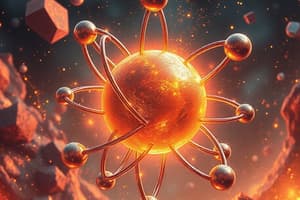Podcast
Questions and Answers
Which of the following are examples of qualitative properties of matter? (Select all that apply)
Which of the following are examples of qualitative properties of matter? (Select all that apply)
- Taste (correct)
- Mass
- Odor (correct)
- Volume
Which of the following properties of matter can be reversed?
Which of the following properties of matter can be reversed?
- Physical property (correct)
- Chemical property
What are the four elements identified by ancient philosophers?
What are the four elements identified by ancient philosophers?
Fire, water, air, earth
All matter is made of atoms that are uncuttable.
All matter is made of atoms that are uncuttable.
Who proposed the idea that atoms are the fundamental units of matter?
Who proposed the idea that atoms are the fundamental units of matter?
According to Aristotle, elements can transform from one another due to __________.
According to Aristotle, elements can transform from one another due to __________.
What term did Epicurus use to describe his ideology about atoms?
What term did Epicurus use to describe his ideology about atoms?
Flashcards are hidden until you start studying
Study Notes
Matter and Its Properties
- Properties of matter are categorized into qualitative (e.g., taste, odor) and quantitative (e.g., volume, mass).
- Chemical properties indicate irreversible changes (e.g., oil mixed with food), while physical properties are reversible (e.g., salad).
Four Elements Theory
- Heraclitus identified fire as a fundamental element, emphasizing energy.
- Thales of Miletus proposed water as a primary element.
- Anaximenes suggested air as an essential element.
- Empedocles (also known as Epidocles) added earth to the list and stated that these elements must be balanced to avoid chaos.
Atomic Theory
- Leucippus and Democritus introduced the idea of atoms (atomus) as the basic building blocks of matter.
- All matter is composed of atoms, deemed uncuttable, necessary to form physical substances.
- Atoms are in constant motion within the void, or space.
Characteristics of Atoms
- The uniformity of atoms and the claim that they are solid and without internal structure is debated.
- Atoms come in various shapes and sizes, which contradicts some earlier views.
- Epicurus contributed to the concept of atomism, stating atoms possess different weights yet travel at the same speed, regardless of size.
- Aristotle introduced the idea of aether as the fifth element, existing beyond Earth.
- He posited that elements could transform into one another.
States of Matter
- Solids are characterized by being almost incompressible, with particles vibrating in fixed positions and unable to slide past one another, resulting in high density.
Studying That Suits You
Use AI to generate personalized quizzes and flashcards to suit your learning preferences.




